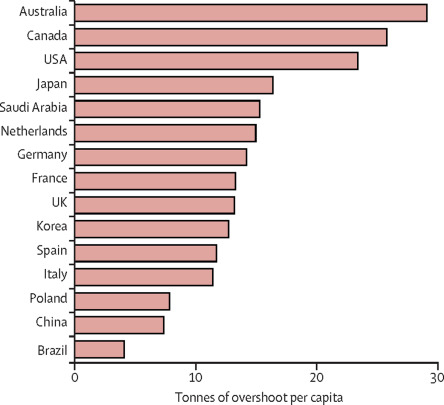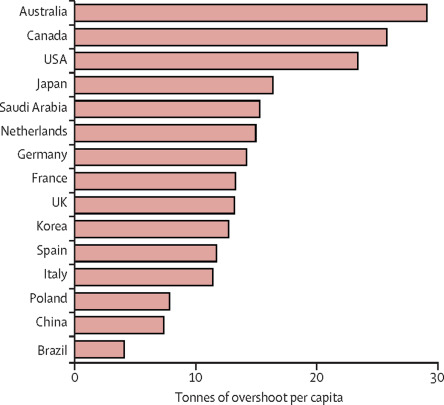
US and EU account for most volatile global resource extraction
High-income countries accounted for 74% of the global excess in resource extraction in the period 1970–2017, driven mainly by the US and EU countries.
This is demonstrated in an international study led by Jason Hickel, a researcher at the Institute of Environmental Science and Technology at the Université Autónoma de Barcelona (ICTA-UAB), which determines the national responsibility for ecological degradation by calculating the extent of each country. . The sustainable use of resources has exceeded its fair share of limits.
Autonomous University of Barcelona,
Human impacts on Earth system processes are crossing many planetary boundaries, not only in terms of CO2 emissions and climate change, but also in terms of land use change, biodiversity loss, chemical pollution and biogeochemical fluxes. This ecological collapse is largely being caused by global resource extraction, which has increased rapidly over the past half century and has now dramatically exceeded safe and sustainable levels.
It is estimated that the world economy consumes more than 90 billion tons of material per year, which is well above the sustainable limits of industrial ecologists.
This new study proposes a new method for determining national responsibility for ecological degradation. “Not all nations are equally responsible for this trend; Some nations use significantly more resources per capita than others through material extraction, production, consumption and waste,” explains ICTA-UAB researcher Jason Hickel.
Between 1970 and 2017, approximately 2.5 trillion tons of material were mined globally, with high- and middle-income countries using the vast majority of these resources. Of these, 1.1 trillion tonnes were above the Sustainable Corridor.
The study shows that in the period 1970–2017 high-income countries (with 16% of the world’s population) accounted for 74% of global excess resource use, mainly the United States (27%) and high-income countries. countries operated by European Union (25%). Spain ranks 11th in the list of 15 countries that have exceeded the sustainable planetary limit of raw material use. Spain accounts for an additional 2%, behind countries such as Japan, Germany, France, the United Kingdom, Canada and Italy.
China, an upper-middle income country, ranks second globally and accounts for 15% of global surplus material use. The rest of the global South (ie low- and middle-income countries in Latin America and the Caribbean, Africa, the Middle East and Asia) accounts for only 8%. Similarly, 58 countries in the Global South, representing 3.6 billion people and including India, live within sustainable levels.
research published in the journal Lancet Planet Health Using data from the United Nations International Resource Panel and additional calculations, we analyzed materials involved in domestic extraction, as well as global trade flows of resources such as fossil fuels, wood, metals, minerals and biomass.
National responsibility has changed over the period of analysis. While the US surplus has steadily increased in absolute terms, its share in the global surplus has gradually declined over the past two decades, a similar trend for Europe and other high-income countries. This change is mainly due to the increased use of resources in China, which are mainly made of building materials. China’s overflow only began in 2001, but increased rapidly in subsequent years.
“The results show that prosperous nations bear enormous responsibility for global ecological collapse and therefore pay an ecological debt to the rest of the world,” explains Jason Hickel, who stresses that “these countries should This needs to lead to radical reductions in resource utilization to avoid further degradation, which may require a transformative post-growth and de-growth approach.”
Per capita average annual excesses of the 15 greatest absolute excesses, 1970–2017. https://doi.org/10.1016/S2542-5196(22)00044-4 . in
reference:
National responsibility for ecological breakdown: a fair-share assessment of resource use, 1970–2017
Professors Jason Hickel, PhD, Daniel W. O’Neill, PhD, Andrew L. Fanning, PhD, Huzaifa Joomkawala, BS
Lancet Planetary Health – Volume 6, Issue 4, e342-e349, April 01, 2022
it hurts:https://doi.org/10.1016/S2542-5196(22)00044-4
Henrique Cortez *, translation and editing.
In Ecodebate, ISSN 2446-9394, 04/11/2022
The maintenance of the electronic magazine EcoDebate is possible due to technical support and hosting easy port,
[CC BY-NC-SA 3.0][ O conteúdo da EcoDebate pode ser copiado, reproduzido e/ou distribuído, desde que seja dado crédito ao autor, à EcoDebate com link e, se for o caso, à fonte primária da informação ]
Inclusion in the distribution list of the daily bulletin of the electronic magazine EcoDebate, ISSN 2446-9394,
If you would like to join our daily newsletter distribution list, simply send an email to [email protected]. Your email will be included and you will receive a message asking you to confirm your subscription.
EcoDebate does not practice spam and the purpose of requiring you to verify the source email is to prevent your email from being improperly included by third parties.
Deleting the distribution list of the daily bulletin of the electronic magazine EcoDebate
To unsubscribe from this group, send an email to [email protected] or [email protected]. Your email will be deleted and you will receive a message confirming the deletion. Note that removal is automatic but not instantaneous.



